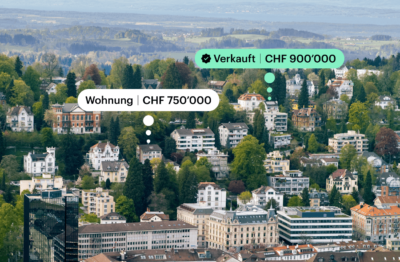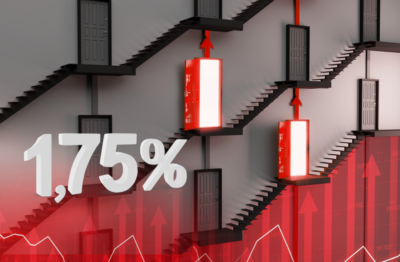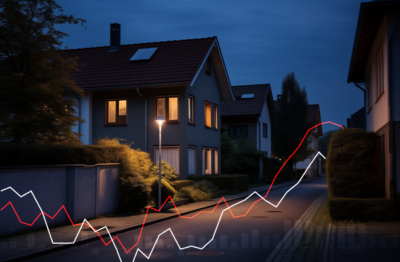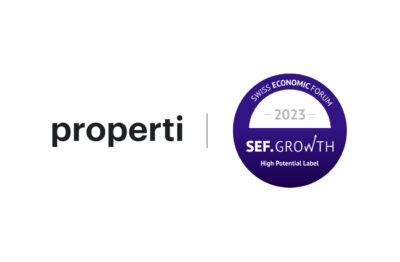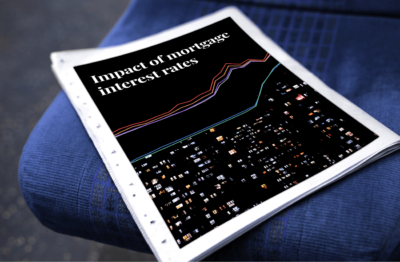In Switzerland, property gains tax is payable on the sale of a house. These also exist under similar terms in many other countries. As this tax rate can significantly reduce profits, it is important to deal with it in good time. Here you can find out what property gains tax is, who has to pay it, how it is calculated, how high it is and whether it is possible to avoid or reduce taxation on property gains.
Table of contents
ToggleWhat is the real estate gains tax?
The profit tax on the property is a tax rate on the sales profit realized. The profit is calculated from the difference between the selling price and the acquisition cost. In addition to the purchase price, subsequent, value-enhancing investments are also included in the acquisition costs – provided you can provide receipts for them.
By taxing property income, the Confederation is able to levy taxes on the sale of real estate. As properties are usually large items of value, the tax is lucrative for the state. For the seller or buyer of a property, however, it means that the profit is reduced or the purchase price is increased.
Who has to pay the property gains tax?
Taxation of property gains must normally be paid by individuals and legal entities when selling property. The change of ownership of a property is also subject to this tax. This means that the exercise of purchase rights in favor of a third party or the sale of more than 50% of the participation rights in a real estate company is also taxed.
The property gains tax is paid by the person who generates income from the sale of the property. This is typically the seller. However, if the buyer is not in a position to pay the profit tax on the property, the tax office will ask the buyer to pay.
Important note for buyers: Before buying a property, make sure that the seller is in a position to pay the deductions from the property income.
How can I avoid property gains tax?
If the tax office levies taxes on property gains, you should also pay them. However, there are some exceptions where taxation is deferred. Postponement is possible in the following cases:
- Change of ownership through inheritance or gift
- Change of ownership between spouses in connection with matrimonial property law
- Settlement of one spouse’s extraordinary contributions to family maintenance
- Land reallocations
- Corporate restructuring
- Sale of a permanently owner-occupied property, provided you invest the proceeds within two years in a replacement property in Switzerland that is also permanently owner-occupied
However, postponed is not canceled: The full tax is due if you sell the house to a third party without buying a replacement. If you only invest part of the profit in the purchase of a Swiss replacement property, you will have to pay tax on the remaining part as part of the deductions from the proceeds of the property.
Please also note that the profit tax deferral only applies to owner-occupied residential property. You must pay the full property gains tax for the vacation or second home. This means that the deferral is normally only possible for private individuals who buy an equivalent or more expensive property from the proceeds of the sale.
Tip: Ask your canton for information on local regulations, as these vary from region to region.
You can now also get free advice from our real estate experts.
Arrange a consultation now!What do I need to consider as a home buyer?
In Switzerland and the cantons, it is customary for the commercial agent of a property to pay the deductions on the property gains. If he is unable to meet this obligation, you as the new owner of the property will have to settle this tax debt. Please note that the tax authorities have a lien on the property, which is why you can be held liable as the owner.
It is therefore all the more important that you require the seller to guarantee the property gains tax. Proceed as follows to ensure the best possible protection:
- Find out from the tax office in your canton or place of residence whether the payment of deductions from the property proceeds is outstanding
- Ask the sales representative to deposit the amount owed – the tax authority can calculate the duties likely to be due
- Agree that you will deposit the purchase price in an account to which the seller will not have access until the property gains have been paid
- Alternatively, you can offer to pay the amount on behalf of the trader and deduct this sum from the purchase price
- Insist that the payment of property gains tax by the seller is expressly regulated in the purchase contract
How high is the property gains tax?
The distribution of land revenue always varies slightly within Switzerland and the cantons. However, it can be estimated in advance. The following three factors are decisive for the amount of the payment:
- Holding period of the property
- Amount of profit on sale
- Tax rate in the relevant canton
This means that the longer you have owned a property before selling it, the lower the taxes will be. This is intended to avoid speculative purchases and sales of properties. In Germany, this is known as the speculation period.
The amount of profit speaks for itself. In Switzerland, the canton in which you sell your property makes a big difference. In Thurgau, for example, gains of CHF 200,000 with a holding period of five years are taxed at up to CHF 80,000, whereas in Zug only CHF 20,000 would be taxed for the same property. Different regulations also apply in other cantons.
Incidentally, the market value of a property over the last 10 to 30 years is normally used as the basis for calculating the acquisition costs of a property. This is particularly important for old buildings that have been in the family for a long time and only cost a few thousand francs in the past. However, since the subsequent calculation of the market value is prone to errors, it is worth having a professional do the math – we will be happy to assist you with your property valuation!
Real estate valuation
How can property gains tax be calculated?
The following formula is used to calculate the property gains tax:
Land profit = proceeds – investment costs
The proceeds refer to the purchase price, which includes all services provided by the acquirer. The investment costs are made up of the original purchase price and value-adding investment costs. Value-enhancing investments are, for example, modernizations that have optimized both the quality and the comfort of the property.
You should therefore deduct all value-enhancing investments in order to calculate your expected property proceeds. This is the best way to reduce the levy. If possible, make sure to sell a full year after purchase to further reduce the tax, as the tax decreases with each year of ownership.
The following value-enhancing investments are included in the investment costs:
- Building a conservatory
- Conversion of the attic
- Creating a garden
- Modernized bathrooms
You can also deduct the selling costs from the proceeds. These are, for example, estate agent commissions, expenses for advertisements, transfer taxes, notary fees and prepayment penalties to the bank. This can quickly add up to over CHF 10,000 – the prerequisite for the deduction is that you submit the original receipts to the tax office.
Once you have compiled all these items, you can calculate the estimated profit tax on your property online. The relevant canton will also help you to get an initial idea of the charges due.
Note: Ask your tax advisor for help with both the purchase and sale of real estate. This helps to avoid unnecessary levies, reduce necessary levies and make the best investment decisions.
Tip: Try out our online property gains tax calculator, which will reliably determine the amount of gains tax you are likely to pay on your property free of charge.
To the property gains tax calculatorWho benefits from the property gains tax?
Property gains tax is a special tax that is now an important source of income for many Swiss cantons. Like all tax revenue, property gains tax belongs to the state. It remains in the canton in which it was levied.
In the canton of St. Gallen, for example, property gains tax brought in CHF 100 million in 2018. This is the canton’s fourth-largest source of income. Like other taxpayers’ money, it is used for social security systems, for the remuneration of public sector employees, for infrastructure and other public services, and ultimately benefits all Swiss citizens.
The autonomy of the cantons in terms of rates means that each canton achieves different values for property gains tax. What is certain, however, is that profits from the tax have risen dramatically in recent years: In 2010, the Swiss Confederation took in CHF 1.6 billion from property gains tax, while in 2020 the figure was already CHF 2.5 billion. This corresponds to an increase of over 50 percent.
Where is the property gains tax highest?
Property gains tax is often referred to as the “speculation bar”. This is because it is intended to prevent speculation in real estate, particularly in affluent areas, which is only looking for quick profits.
In cantons such as St. Gallen and Basel-Land, the rates of property gains tax are particularly high: in St. Gallen the tax is 26.4 percent and in Basel-Land it is 25 percent. By contrast, only 5 percent is incurred in Valais. And in Geneva, sellers no longer have to pay property gains tax after 20 years of ownership.
Another example: for a profit of CHF 200,000, sellers who sell within five years must pay CHF 20,000 in property gains tax in the city of Zug. In Frauenfeld, on the other hand, the tax would be 80,000 francs, i.e. four times higher.
What does this mean for sellers?
Sellers should find out about the applicable property gains tax in their canton as early as possible – ideally when buying the property. Depending on what you plan to do with the property, the tax can be significantly reduced. In any case, you should be aware that even if you sell an inherited property, you may have to expect a significant reduction in profit due to property gains tax.
Taxes when selling a house often determine whether the sale is worthwhile at all. These taxes, also known as property gains tax, also apply to the sale of apartments. It is therefore best to seek advice from an experienced expert.
You can use our property gains tax calculator today to find out how much house sale tax you would have to pay if you sold today. This helps you to make an informed decision. Calculate your tax rate now!
What other taxes are relevant for property owners in Switzerland?
As a property owner, you need to be aware of and pay attention to other taxes in addition to the tax on property income. These include property transfer tax, wealth tax and real estate tax.
If you own a rental property, you must pay tax on the rental income from it as part of your income tax. You can read more about this in this article for landlords. But even if you use your property yourself, a tax is payable that corresponds to the so-called imputed rental value.
Basically, you cannot avoid taxes for property owners. However, as this depends on the value of the property, your income and your tax bracket, there should be no nasty surprises. Make sure you are well informed about all tax aspects and always keep your receipts so that you can prove that you can deduct expenses from tax if necessary.
Would you like to be kept up to date with news and interesting facts from the world of real estate? Then sign up for the Properti newsletter here!
Subscribe to our newsletter nowAll data are without guarantee. The information on these Internet pages has been carefully researched. Nevertheless, no liability can be assumed for the accuracy of the information provided.





